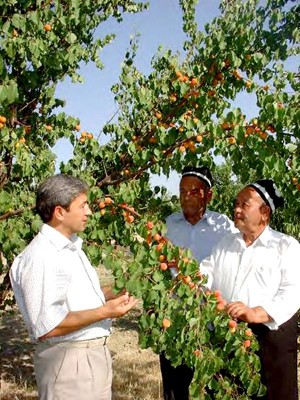
Challenge
The old Tajik city of Isfara is famous for its apricot orchards. Apricot production is the main source of income for the population of this region, and for years the high productivity allowed exports to countries of the former Soviet Union. But in the last 10 years orchard production declined dramatically, and product quality did not meet market standards. Customers stopped purchasing Tajik apricots.
Initiative
To restore the productivity of the orchards and regain the revenues they used to bring, Abdumukim Mirkarimov, Tajik entrepreneur and the owner of the Khamzaev Farm, contacted the USAID Farmerto- Farmer Program requesting a specialist in apricot husbandry. The program arranged for professor Wayne Williams to travel to Tajikistan. The USAID-funded expert focused his efforts on training the farmers at Khamzaev Farm in modern pruning methods, pest control, soil analysis, fertilization, and other practices of modern horticulture. For many of the farmers, this had been their first encounter with modern practices of pest management and pruning. In addition to people working at Khamzaev Farm, Williams also trained owners and workers from 20 neighboring farms, each with 5-6 hectares of orchards. At the request of these farmers, Williams assessed their orchards and advised on necessary improvements.
Results
Williams’ recommendations were put into practice immediately. Mirkarimov used his capital to obtain the fertilizer, pruning tools, and other resources suggested by the expert. He also helped his neighbors purchase similar supplies for their orchards, while they agreed to supply Mirkarimov with quality produce for export to Russia. A year and a half after the USAID expert worked with the farms, their production rose by 80%. The fruit now meets higher quality standards, and the farmers are able to sell to the Russian Siberian market where the wholesale price for fresh apricots is $3 per kilogram compared to Tajikistan’s $0.15 per kilogram. Khamzaev Farm and its neighbors signed a $250,000 contract with Russian customers to deliver 80 tons of fresh and 15 tons of dried apricots. This contract contrasted with $1,300 sales revenues these farmers used to receive in the local market before they benefi ted from the USAID program.







Comment
Make a general inquiry or suggest an improvement.